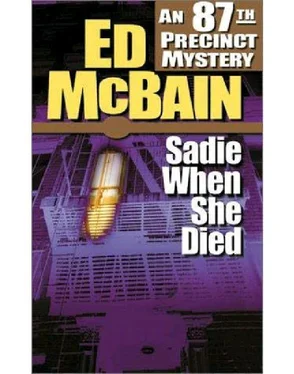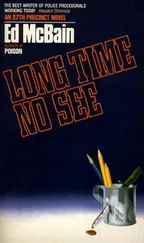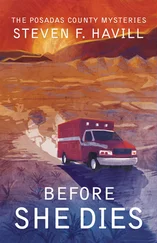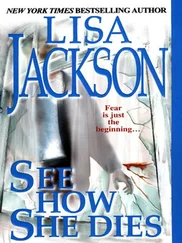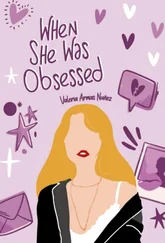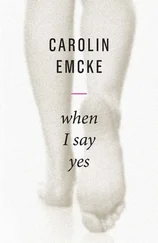Ed McBain - Sadie When She Died
Здесь есть возможность читать онлайн «Ed McBain - Sadie When She Died» весь текст электронной книги совершенно бесплатно (целиком полную версию без сокращений). В некоторых случаях можно слушать аудио, скачать через торрент в формате fb2 и присутствует краткое содержание. Жанр: Полицейский детектив, на английском языке. Описание произведения, (предисловие) а так же отзывы посетителей доступны на портале библиотеки ЛибКат.
- Название:Sadie When She Died
- Автор:
- Жанр:
- Год:неизвестен
- ISBN:нет данных
- Рейтинг книги:4 / 5. Голосов: 1
-
Избранное:Добавить в избранное
- Отзывы:
-
Ваша оценка:
- 80
- 1
- 2
- 3
- 4
- 5
Sadie When She Died: краткое содержание, описание и аннотация
Предлагаем к чтению аннотацию, описание, краткое содержание или предисловие (зависит от того, что написал сам автор книги «Sadie When She Died»). Если вы не нашли необходимую информацию о книге — напишите в комментариях, мы постараемся отыскать её.
Sadie When She Died — читать онлайн бесплатно полную книгу (весь текст) целиком
Ниже представлен текст книги, разбитый по страницам. Система сохранения места последней прочитанной страницы, позволяет с удобством читать онлайн бесплатно книгу «Sadie When She Died», без необходимости каждый раз заново искать на чём Вы остановились. Поставьте закладку, и сможете в любой момент перейти на страницу, на которой закончили чтение.
Интервал:
Закладка:
A man named Felix Hopkins dressed for his annual shopping spree in a trenchcoat lined with dozens of pockets to accommodate the small and quite expensive pieces of jewelry he lifted from counters here and there. A tall, thin distinguished-looking black man with a tidy mustache and gold-rimmed spectacles, he would generally approach the counter and ask to see a cigarette lighter, indicating the one he wanted, and then rip off five or six fountain pens while the clerk was busy getting the lighter out of the display case. His hands worked as swiftly as a magician’s; he had been at the job such a long time now that he didn’t even have to unbutton the coat anymore. And though the pockets inside the coat now contained a gold fountain pen, a platinum watch, a gold money clip, a rhinestone necklace, an assortment of matched gold earrings, a leather-bound traveling clock, and a monogrammed ring with a black onyx stone, he still protested to the arresting officer that he had bought all these items elsewhere, had thrown away the sales slips, and was taking them home to wrap them himself because he didn’t like the shitty job the stores did.
Most of the other shoplifters were junkies, desperate in their need, unmindful of store detectives and city detectives, sorely tempted by the glittering display of goods in what was surely the world’s largest marketplace, knowing only that whatever chances they took might net them a bag or two of heroin before nightfall, guarantee them a Christmas Day free from the pangs of drug-hunger and the pains of withdrawal. They were the pitiful ones, pacing the detention cage at the rear of the squadroom, ready to scream or vomit, knowing that being busted meant cold turkey for Christmas Day, with the only hope being methadone instead—maybe. They were looked upon with disdain by the haughty professionals like Hester Brady of the pregnant bloomers, Felix Hopkins of the pocketed raincoat, and Junius Cooper of the paper-stuffed packages.
Junius Cooper had figured out his dodge all by himself. He was a man of about forty-three, well-dressed, looking somewhat like a harried advertising executive who was rushing around picking up last-minute gifts his secretary had neglected to buy. He came into each department store carrying several shopping bags brimming with gift wrapped parcels. His modus operandi worked in two ways, both equally effective. In either instance, he would stand next to a man or woman who was legitimately shopping and who had momentarily put his own shopping bag on the floor or on the counter top. Junius would immediately: (a) transfer one of the legitimate shopper’s gift-wrapped packages into his own shopping bag or (b) pick up the legitimate shopper’s bag and leave his own bag behind in its place. The beautifully wrapped boxes in Junius’ bag contained nothing but last Sunday’s newspapers. His system was a bit potluckish, but it provided the advantage of being able to walk innocently past department-store cops, carrying packages actually paid for by bona-fide customers and wrapped by department-store clerks. It was almost impossible to catch Junius unless you saw him making the actual exchange. That was how he had been caught today.
This mixed bag of shoplifters mingled in the squadroom with their first cousins, the pickpockets, who similarly looked upon the frantic shopping days before Christmas as their busiest time of the year. A pickpocket enjoys nothing better than a crowd, and the approaching holiday brought the crowds out like cockroaches from under the bathroom sink: crowds in stores, crowds in the streets, crowds in the buses and subways. They worked in pairs or alone, these light-fingered artists, a nudge or a bump, an “Oh, excuse me,” and a purse delicately lifted from a handbag, a hip pocket slit with a razor blade to release the bulging wallet within. There was not a detective in the city who did not carry his wallet in the left-hand pocket of his trousers, close to his balls, rather than in the sucker hip pocket; cops are not immune to pickpockets. They were surrounded by them that afternoon, all of them innocent, naturally, all of them protesting that they knew their rights.
The drunks did not know their rights, and did not particularly care about them. They had all begun celebrating a bit early and had in their exuberance done one thing or another considered illegal in this fair city—things like throwing a bus driver out onto the sidewalk when he refused to make change for a ten-dollar bill, or smashing the window of a taxicab when the driver said he couldn’t possibly make a call to Calm’s Point on the busiest day of the year, or kicking a Salvation Army lady who refused to allow her trombone to be played by a stranger, or pouring a quart of scotch into a mailbox, or urinating on the front steps of the city’s biggest cathedral. Things like that. Minor things like that.
One of the drunks had killed someone.
He was unquestionably the star of the 87th’s little Christmas celebration, a small man with vivid blue eyes and the hands of a violinist, beetling black brows, a mane of black hair, stinking of alcohol and vomit, demanding over and again to know just what the hell he was doing in a police station, even though there was blood all over his white shirt front and speckled on his pale face and staining his long thin, delicate fingers.
The person he had killed was his sixteen-year-old daughter.
He seemed to have no knowledge that she was dead. He seemed not to remember at all that he had come into his apartment at three o’clock that afternoon, little more than an hour ago, having begun his Christmas celebrating at the office shortly after lunch, and had found his daughter making love with a boy on the living-room sofa, the television casting unseen pictures into the darkened room, television voices whispering, whispering, and his daughter locked in embrace with a strange boy, skirts up over belly and thighs, buttocks pumping, ecstatic moans mingling with the whisper of television shadows, not hearing her father when he came into the room, not hearing him when he went into the kitchen and searched in the table drawer for a weapon formidable enough, punishing enough, found only a paring knife and discarded that as unequal to the task, discovered a hammer in the shoebox under the sink, hefted it on the palm of his hand, and, thin-lipped, went into the living room where his daughter still moaned beneath the weight of her young lover, and seized the boy by the shoulder and pulled him off her, and then struck her repeatedly with the hammer until the girl’s face and head were gristle and pulp and the boy screamed until he fainted from exhaustion and shock and the woman next door ran in and found her neighbor still wielding the hammer in terrible dark vengeance for the unpardonable sin his daughter had committed on the day before Christmas. “George,” she had whispered, and he had turned to her with blank eyes, and she had said, “Oh, George, what have you done?” and he had dropped the hammer, and could not remember from that moment on what he had done.
It was a nice little Christmas party the boys of the 87th had.
He had forgotten, almost, what she looked like.
She came through the hospital’s chrome and glass revolving doors, and he saw at first only a tall blond girl, full-breasted and wide-hipped, honey blond hair clipped close to her head, cornflower-blue eyes, shoving through the doors and out onto the low, flat stoop, and he reacted to her the way he might react to any beautiful stranger stepping into the crisp December twilight, and then he realized it was Cindy, and his heart lurched.
“Hi,” he said.
“Hi.”
She took his arm. They walked in silence for several moments.
“You look beautiful,” he said.
“Thank you. So do you.”
He was, in fact, quite aware of the way they looked together, and fell immediately into the Young Lovers syndrome, positive that everyone they passed on the windswept street knew instantly that they were mad about each other. Each stranger (or so he thought) cased them quickly, remarking silently on their oneness, envying their youth and strength and glowing health, longing to be these two on Christmas Eve, Cindy and Bert, American Lovers, who had met cute, and loved long, and fought hard, and parted sadly, and were now together again in the great tradition of the season, radiating love like flashing Christmas bulbs on a sixty-foot-high tree.
Читать дальшеИнтервал:
Закладка:
Похожие книги на «Sadie When She Died»
Представляем Вашему вниманию похожие книги на «Sadie When She Died» списком для выбора. Мы отобрали схожую по названию и смыслу литературу в надежде предоставить читателям больше вариантов отыскать новые, интересные, ещё непрочитанные произведения.
Обсуждение, отзывы о книге «Sadie When She Died» и просто собственные мнения читателей. Оставьте ваши комментарии, напишите, что Вы думаете о произведении, его смысле или главных героях. Укажите что конкретно понравилось, а что нет, и почему Вы так считаете.
